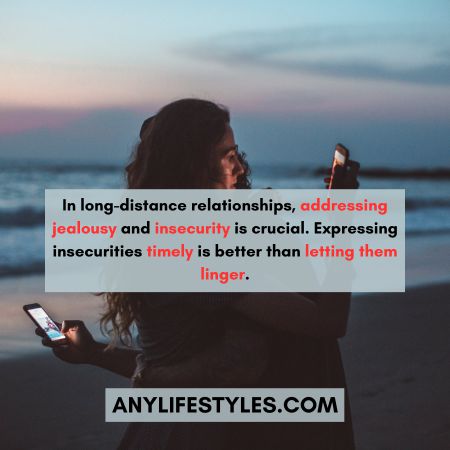Long-distance relationships can be a challenging journey, testing the bounds of love, trust, and communication. While they offer unique advantages, such as personal growth and the excitement of reuniting, it’s important to explore what kills long-distance relationships.
Long-distance relationships can be incredibly rewarding but also quite challenging. To make them work, it’s crucial to be aware of the factors that can put strain on your bond. Lack of communication, trust issues, and infidelity are some common reasons that can weaken a long-distance relationship.

However, with open and honest communication, commitment, and effort from both partners, these challenges can be overcome, and your love can thrive across any distance.
In this article, we will delve into the factors that can strain and potentially end long-distance relationships. Understanding what can threaten these connections is the first step in safeguarding your love across the miles.
What Kills Long Distance Relationships?
Long-distance relationships can encounter several problems that can weaken them. Some common issues that can seriously harm these relationships include not talking enough, not trusting each other, and feeling emotionally distant. To keep a long-distance relationship strong, it’s important to address these problems and work on them together.

When couples don’t talk regularly and openly, they might not understand each other and start feeling more distant.Long-distance situations can put trust, a crucial element in any relationship, to the test. Breaking trust can result in significant problems.
Also, not being able to be physically close and share experiences can make the closeness between you two weaken over time. To avoid a long-distance relationship falling apart, it’s important to notice these issues and make an effort to keep your connection strong.
10 Things That Kills Long Distance Relationships
Below, we will talk about some bad habits that could make your long-distance relationship worse. If you don’t deal with these habits, they can make your connection with your partner weaker and might even threaten the success of your relationship, even if you are far apart.
1. Lack Of Communication:
In long-distance relationships, the lack of communication can be a significant problem. When communication breaks down, it often leads to misunderstandings and hurt feelings. This issue is particularly challenging in a long-distance relationship, where the physical separation is already a barrier.
When one partner doesn’t share their thoughts, feelings, or concerns, the other partner may start to feel neglected or unimportant. This gap that forms between the two partners due to the lack of communication can ultimately result in the end of the relationship.
2. Lack Of Trust – What Kills Long Distance Relationships:
Trust in a long-distance relationship is like building a bridge over a river. It needs a strong foundation, continuous effort, and constant maintenance. Lack of trust often leads to the downfall of such relationships.

In long-distance relationships, trust issues can result from factors like poor communication, jealousy, and insecurity. Extended silence or the involvement of other people can cause neglect and suspicion.
Worries about the relationship’s future and partner commitment worsen these trust problems, often leading to relationship breakdown.
3. Lack Of Efforts:
If your long-distance relationship is causing distress, it could be due to a lack of effort from either you or your partner. Long-term relationships separated by distance commonly face this challenge. To strengthen your bond, be creative in staying connected and prioritizing one-on-one time.
Life can get busy, and schedules may become hectic, but it’s crucial to set aside time for meaningful connections. Make video calls, ask questions, listen attentively, and make your partner feel valued.
Also, plan date nights and give undivided attention a regular practice, not just an occasional treat. These efforts can make a significant difference in preserving a long-distance relationship.
4. Lack Of Emotional And Physical Intimacy:
We all long for emotional closeness and physical intimacy in our relationships. Long-distance relationships can make it tough to fulfill these needs. It’s common for couples in long-distance relationships to grapple with these challenges.
When there’s a lack of emotional and physical intimacy, it can lead to feelings of loneliness and dissatisfaction, even if you deeply love your partner. These unmet needs can strain the relationship. Meeting your partner in person whenever possible can help ease this.
Surprise your partner with flirty messages, video chats, sweet notes, and thoughtful gifts. Revisit cherished memories to keep the connection strong. Don’t take your physical bond for granted just because you see each other less frequently.

5. Different Expectations:
In long-distance relationships, a major challenge is different expectations. When these expectations diverge significantly, it’s a sign of trouble. While some differences are normal, having no common expectations can damage the relationship, creating a disconnect that may lead to its end.
When both partners anticipate different things, it’s crucial to openly communicate and find common ground. Discuss preferences for communication frequency and visitation schedules. Resolving these differences is vital to prevent resentment and sustain a healthy long-distance relationship.
6. Being Unfaithful To Your Partner:
Infidelity is a relationship killer that long-distance couples often fear. The physical separation strains fidelity, tempting individuals with the allure of cheating. It’s essential to be honest with yourself and your partner. If the relationship no longer serves you, it’s better to end it than cheat and hurt your partner.
Infidelity can shatter trust and self-worth, even in a hint. Recognize signs of loyalty, such as stronger connections with others. Infidelity isn’t associated with long-distance relationships; it can happen in any relationship.
Commitment depends on individuals’ choices. Being faithful and loyal is crucial for a successful long-distance relationship.
7. Jealousy And Insecurity – What Kills Long Distance Relationships:
Addressing jealousy and insecurity is crucial when you are living in a long-distance relationship. Expressing insecurities in a healthy manner is more beneficial than letting them fester. Trust, a relationship cornerstone, is even more vital in long-distance love.

Occasional jealousy is normal, but letting it linger without open communication is unwise. Resist controlling behaviors driven by insecurity, and instead nurture trust through dialogue, sharing passwords, introductions, and setting boundaries together.
Long-distance relationships may not be ideal for those prone to frequent insecurity and jealousy, as these emotions can lead to constant suspicion and unfounded accusations, eroding the relationship’s foundation.
External pressures, like friends, family, societal expectations, and cultural differences, can affect a long-distance relationship. Some may not understand or support the relationship, even trying to convince one partner to end it.
This can be tough, especially when there are doubts about the relationship’s future. To overcome these pressures, it’s essential to communicate openly, be willing to compromise and work together to find solutions.
9. Taking Each Other For Granted:
In long-distance relationships, the risk of taking each other for granted can be particularly pronounced. The physical separation can sometimes lead to complacency in communication and effort, as partners may assume the other will always be there despite the distance.
Ignoring things like not keeping promises to call or text, putting off plans, or not paying enough attention may not seem important by themselves. However, over time, these actions can add up and damage the trust and closeness that are important for a good relationship.
To prevent this, both partners must make a conscious effort to appreciate and prioritize each other, even from a distance, to ensure the connection remains strong and secure.
10. Unresolved Fights And Traumas:
In long-distance relationships, infrequent physical meetings can magnify unresolved issues and annoyances over time. It’s important to communicate openly and gently when something bothers you, rather than allowing minor frustrations to turn into lasting resentments.

Avoid keeping a tally of mistakes or using them in future arguments. Instead, assume positive intent, be forgiving, and offer apologies when needed. Video chats are the best medium for resolving issues, while email often leads to hostile conflicts. Phone calls had mixed outcomes.
When To Call Off A Long Distance Relationship?
Deciding when to end a long-distance relationship can be tough. Technology has made it easier to stay connected, but sometimes, despite your efforts, the relationship becomes too damaged to repair.
In such cases, it might be best to call it quits. Let’s explore when it may be time to consider moving on from a long-distance relationship.
1. You Don’t Talk About Future:
In a long-distance relationship, it’s a concern if you and your partner aren’t talking about plans and dreams anymore. Remember when you used to discuss closing the distance, building a life together, and going on adventures? Those talks were important for keeping your long-distance relationship strong.
But if those discussions have faded, and you’re not excited about planning visits anymore, it’s a sign that something might be off. If these things are missing, and your relationship feels more about dealing with day-to-day issues than building a future, it’s time to take a closer look.
2. Toxicity – What Kills Long Distance Relationships:
You might suddenly realize that your life is in chaos because you have invested all your time and energy into keeping the relationship intact. The constant arguments, trust issues, busy schedules, and differences in character can turn it into a ticking bomb ready to explode.
In a healthy relationship, your partner should inspire you to be better, not bitter. If both of you agree on this, the question of when to call off a long-distance relationship becomes clear—it’s time to part ways.
When the relationship turns toxic, disrupting your schedules, and peace of mind, and even causing sleepless nights, it’s an indication that it’s time to leave.
3. Relationship Feels One-Sided:
Using your energy on someone who reciprocates attention is more fruitful. This imbalance is a common long-distance relationship red flag. Whether one partner is doing all the work or the other, when the investment becomes unequal, the relationship loses balance and becomes one-sided.

If you sense that your relationship is one-sided, it’s a crucial moment to consider calling off your long-distance relationship. The imbalance in effort and investment can indicate that the relationship may no longer be fulfilling for both partners.
4. Emotional Disconnect:
To know when it’s time to end a long-distance relationship, think about whether you often feel emotionally distant, like gaslighting or feeling guilty a lot. If the relationship is making you stressed or suffocated, these are big signs that it might be a good idea to break up.
Maybe the exciting romantic feelings you once had are gone, and now you’re not sure where the relationship is heading. If you are avoiding calls and even ghosting your partner to dodge conversations, it’s a clear sign that there’s a big emotional gap.
5. Limited Quality Time:
While it’s understandable that you don’t have to be your partner’s top priority all the time, a certain level of interest is still important. If you find that you rarely talk or spend time together anymore, it’s a valid concern.
Your partner might be going through a busy phase, be it due to a new hobby, increased work responsibilities, or more school commitments. Regardless of the reason, if it feels like your partner isn’t putting in effort to share quality time, it becomes crucial to address the issue.
It is essential to evaluate whether your partner is still committed to making that effort, particularly when faced with the challenge of limited quality time together. If the efforts to spend meaningful time are consistently lacking, it may be a signal to consider calling off the long-distance relationship.
Conclusion – What Kills Long Distance Relationships
Deciding what brings an end to a long-distance relationship presents a challenge. It’s essential to acknowledge that not all relationships lasts forever, and that’s perfectly okay.Higher expectations often lead to more significant disappointments.
Avoid getting stuck in a dysfunctional relationship that might contribute to deepening feelings of depression. If you can’t perceive genuine signs of love in your long-distance relationship, it might be time to consider letting go.
Long-distance relationships demand a substantial investment of time, effort, and empathy. Acknowledging the conflict of loving someone but struggling with the challenges of distance is entirely acceptable.
While love is important, other aspects such as communication and understanding your partner’s perspectives play crucial roles. If it becomes evident that the relationship is no longer making you happy, it’s okay to walk away.










